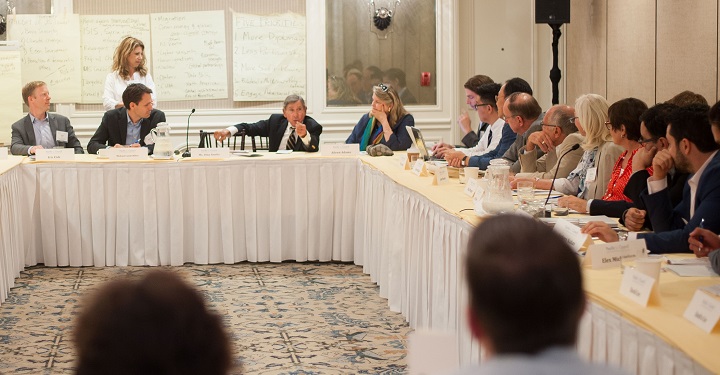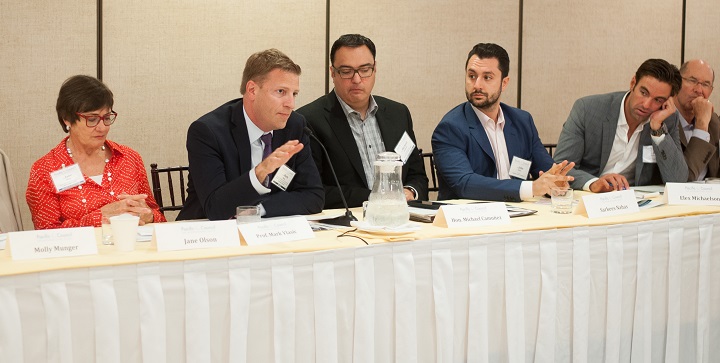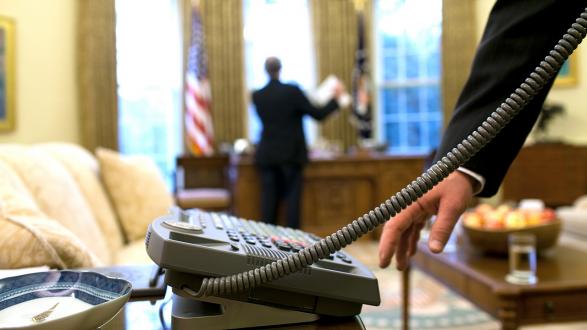In:
What are the most pressing foreign policy issues for the 45th U.S. president?
Participants aimed to reach consensus on that question during a working group discussion at the Pacific Council’s Members Weekend conference on October 10, but it turned out to be a challenging goal. Is Putin’s posturing more important than the nuclear deal with Iran? Is the Trans-Pacific Partnership more important than action on climate change?
Indeed, the diversity of opinions reflected the inherent complexities in U.S. foreign policy. Simply put: when there are so many pressing issues, ranking them becomes nearly impossible.

Instead, participants made a recommendation for the next Commander in Chief: the United States needs to develop a unified strategic framework on foreign policy, to include diplomacy and engagement, economic statecraft, human rights, global leadership, and the American public.
Diplomacy and Engagement
First, the next U.S. president must place more faith in persuasive diplomacy and soft power over coercive diplomacy and hard power. Dr. Geoffrey Wiseman, a professor of international relations and public diplomacy at USC, argued, “On the whole, it is better to engage, rather than isolate, your adversaries.”
The United States has relied on its military capacity to achieve its foreign policy objectives over the last decade, particularly in Iraq and Afghanistan. Dr. Wiseman argued that deploying soft power measures is more effective and will bolster the U.S. reputation during times of international crisis.
Citing the normalization of relations with Cuba as a standard for engagement, Dr. Wiseman asserted the need to engage adversaries and competitors rather than to isolate them. He argued for a reinstitution of formal diplomatic relations with Iran and improved bilateral relationships with China and Russia: “Inaction in this arena can only weaken America’s standing,” he said.
Economic Statecraft
Second, we need to perfect the art of economic statecraft. “The Chinese are eating our lunch in terms of their deployment of economic power,” lamented Michael Camuñez, President and CEO of MannattJones Global Strategies. “Our inability to project economic strength is a major hindrance. We have not figured out a way to adequately promote our values through economic dynamics.”
United States, Canada, and Mexico together can leverage their combined economic strength to effectively project Western values and interests around the world.
According to Camuñez, North America is the perfect place to start. As yet, the United States has failed to prioritize North America as a foreign policy priority, to its own detriment. “North America, as a regional economic bloc, is the one of the most powerful economic platforms that exists,” he said. The United States, Canada, and Mexico together can leverage their combined economic strength to effectively project Western values and interests around the world.
Using North America at the starting point, argued Camuñez, the next U.S. president can also deepen America’s strategic relations through free trade agreements with other regional blocs.
Human Rights
Third, the next U.S. president needs to put the United States into a lead role on the promotion and protection of human rights. Justin Connolly, Director of Human Rights Watch in Southern California, pointed to the current global migration and refugee crisis. “One of the biggest issues facing us going forward will be migration. The current structures that deal with refugees are overwhelmed,” he said.

As millions of people languish in refugee camps throughout Africa and the Middle East, discussants agreed that the White House needs to be involved in building better systems to prevent such crises from happening in the first place. The effects of climate change and political destabilization will only worsen the refugee crises and human suffering around the world in the future.
Global Leadership
Fourth, Washington needs to project leadership. Georgetown professor Dr. Mark Vlasic, who previously served as a war crimes prosecutor for The Hague and as the Head of Operations for the Stolen Assets Initiative at the World Bank, argued that America should leverage its global partnerships to tackle issues that impact all of humanity, such as transnational crime and terrorism financing.
The American Public
Finally, all of this is predicated on building consensus: in order to create and execute a successful foreign policy framework, the next U.S. president must engage the American people with her or his vision for the future.
As one participant noted, “Unless the next president understands the importance of engaging and persuading the American people, Congress, and our allies on any of these issues, nothing will go forward.”
____________________
This article is based on comments made during a working group discussion at the Pacific Council's annual Members Weekend conference on October 10.




